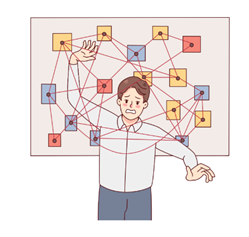Inspired by the focus groups the EDIT Lab conducted with participants from the Twins Early Development Study, EDIT Lab members Aliyah (placement student) and Elisavet (PhD student) write about anxiety in emerging adulthood.
Unlike their predecessors, young adults (under 30s) have been thrown into a technology-oriented lifestyle where access to knowledge is vast and instantaneous. While it has been suggested that members of this group are chronically online, individualistic and have the highest prevalence of mental illness, they are also pragmatic and care deeply about societal issues, including climate change and diversity.
The ways in which this generation experience their youth is largely different to that of prior generations. “Emerging adulthood” is a relatively recent way of conceptualising the development of those between the ages of 18 and 29 (Arnett, 2014). This period involves vast changes where one has the opportunity to exercise freedom, independence and decision-making in a time of fluctuation and uncertainty. Researchers discuss how this uncertainty is inevitable, and often manifests as symptoms resembling mental health difficulties, when in fact high levels of stress during this period is normal. However, whilst natural, prolonged stress can affect young adults’ mental health. Women in particular report higher levels of factors ranging from psychological distress to minor hassles along with emotional coping styles (Matud et al., 2020). This is in contrast to men who tend to score higher in self-esteem and are more likely to have rational coping styles (Matud et al., 2020). Inevitably, the ways in which someone manages their daily lives has a huge impact on the way they experience distress.
Anxiety in Young Adults
A recent report showed that 86% of adults aged between 18-24 years had felt anxious in the previous two weeks. Additionally, the survey showed that 58% of these individuals felt that anxiety interfered with their daily activities (Mental Health Foundation, 2023). These results highlight the increasing levels and impact of anxiety in young adults.
Members of the EDIT Lab organised focus groups with participants from the Twins Early Development Study (TEDS) to discuss their experiences with anxiety. TEDS is a longitudinal twin study which recruited participants born between 1994 and 1996 in England and Wales (Lockhart et al., 2023). When we asked some of these participants what they were feeling most anxious about, three main themes emerged:
- Technology and social media
- Job, financial and housing instability
- Experiencing multiple major international crises within a (very short) lifetime
Technology and Social Media
Technology was one of the most frequently spoken about topics in the anxiety focus groups. Participants shared that while forms of social media are stimulating and provide access to resources that expand our knowledge-base, they also lead to feelings of exhaustion and stress. Social media has increased how much we compare ourselves to others. This was perhaps also amplified by the loss of face-to-face interactions over the pandemic years.
“There’s a pressure to always show the best version of myself on social media, while at the same time not being too perfect and making other people feel bad about themselves.”
Moreover, the rise in open conversations about mental health on social media came up as something that may make people more likely to recognise symptoms. Although this increases mental health awareness, it is something which can also cause feelings of stress. Studies have been undertaken to explore these issues, with associations found between increased screen time and late adolescent anxiety, though the direction of effects is not clear (Khouja et al., 2019).
More recently, researchers have also found that the frequency with which anxiety words and technology-related (digitalisation) words are used within the same context has increased. This increase has been shown across 6 different languages (Teepe et al., 2023), suggesting that the ongoing uptake in new forms of technology may well be causing newfound fears.
Job, financial and housing instability
The role of instability as a trigger of anxiety was discussed in great detail in the focus groups. Participants suggested that prior generations perhaps followed a more standard life trajectory, in comparison to those entering adulthood today. Educational pressure starts young, and combined with the unstable job and housing markets, these have become major sources of anxiety.
One participant reflected that:
“I’m working really hard, but I still can’t achieve the same things [as previous generations]. It feels as though owning a house or having a secure job is being pushed further and further away.”
This has been echoed in research. A study conducted amidst the pandemic found associations between recent or upcoming household/job loss and risk of poorer mental health, in particular, levels of anxiety and depression (Ganson et al., 2021). However, again, the interpretation of these associations should be made with caution as their direction is not clear.
Experiencing multiple major international crises within a (very short) lifetime
A slightly more nuanced theme brought to light within the focus groups was that young adults seem to be experiencing multiple negative experiences within the (so far short) course of their lifetime.
“With COVID, clim
ate change, and the cost of living crisis, it feels like we’re experiencing a once in a lifetime event every year…”
The cumulative effect of so many negative events seems to put pressure on young people. Participants spoke about the sense of a constant feeling of responsibility looming over them, suggesting that it contributes to a general worry which perhaps then further triggers more specific anxieties. This deteriorating effect, also known as a thought spiral, may severely impact those who experience it.
In sum, young adults today have a multitude of stressors to cope with. Not only is this period of time lacking stability, but both our focus groups and research indicate just how much pressure young adults feel under. This highlights the need to prioritise anxiety and mental health research in youth and to explore the risk factors unique to this generation.
We want to end this blog by thanking the twins who volunteered their time to talk to us. Your input is incredibly helpful and we couldn’t be more appreciative. Stay tuned for our next blog post where we will be interviewing the Director of TEDS, Prof. Thalia Eley, about what researchers can do to tackle this.




